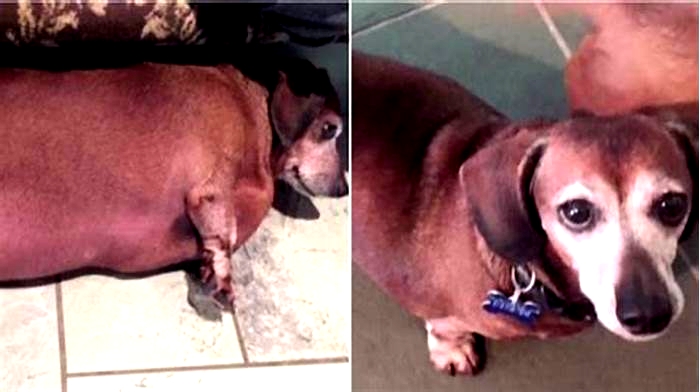Dachshund Obesity A Comprehensive Guide for Owners

Common Dachshund Health Issues: A Comprehensive Guide
When you think of Dachshunds, their elongated bodies often symbolize their playful and curious nature.
However, beneath their charming exterior, lies a series of health concerns that can affect these beloved dogs.
From spinal issues that are inherent to their unique build to dental problems that may go unnoticed, Dachshunds require special care to ensure their well-being.
As you navigate through the list of common health issues faced by Dachshunds, you'll uncover essential information that can help you proactively address these concerns and provide the best possible care for your furry companion.
Key Takeaways
- Immediate veterinary care is crucial for spinal issues like IVDD in Dachshunds.
- Weight management through exercise and diet is essential to prevent obesity in Dachshunds.
- Regular dental care and dietary recommendations are important to address dental problems in Dachshunds.
- Early detection, regular check-ups, and appropriate treatment options are vital for managing eye disorders in Dachshunds.
Spinal Issues
If your Dachshund experiences spinal issues, it's crucial to seek immediate veterinary care to address the potential underlying causes and provide appropriate treatment. Spinal issues in Dachshunds are a common concern due to their elongated backs, which can predispose them to intervertebral disc disease (IVDD). Depending on the severity of the condition, treatment options may include rehabilitation therapy, surgical intervention, physical therapy, and pain management.
Rehabilitation therapy plays a pivotal role in helping Dachshunds recover from spinal issues. Through targeted exercises and techniques, rehabilitation therapy aims to strengthen the muscles supporting the spine, improve mobility, and enhance overall recovery. Additionally, surgical intervention may be necessary in severe cases where conservative treatments are ineffective or if the spinal issues lead to neurological deficits.
Physical therapy can complement rehabilitation therapy by focusing on specific movements and activities to aid in the Dachshund's recovery process. Pain management is also crucial to ensure your furry friend's comfort and well-being throughout the treatment journey. Remember, early intervention and a comprehensive treatment plan are key to helping your Dachshund overcome spinal issues effectively.
Obesity
Addressing obesity in your Dachshund is crucial for maintaining their overall health and well-being. Weight management plays a significant role in preventing various health issues related to obesity. Implementing appropriate exercise routines tailored to your Dachshund's needs is essential. Regular walks, playtime, and engaging activities can help manage weight and improve overall fitness levels.
In addition to exercise, dietary restrictions and portion control are vital aspects of combating obesity in Dachshunds. Feeding your Dachshund a balanced diet with the right amount of nutrients while controlling portions can prevent excessive weight gain. Avoiding excessive treats and table scraps is crucial in maintaining a healthy weight for your furry companion.
Consulting with your veterinarian can provide valuable insights into creating a suitable weight management plan for your Dachshund. They can offer guidance on appropriate exercise routines, dietary recommendations, and monitoring your pet's progress to ensure they remain at a healthy weight. Prioritizing weight management through exercise and proper nutrition can significantly enhance your Dachshund's quality of life and longevity.
Dental Problems
Proper dental care is essential for maintaining your Dachshund's overall health and well-being. Dental problems are common in Dachshunds and can lead to serious health issues if left untreated. By following dietary recommendations and prevention tips, you can help keep your furry friend's teeth and gums healthy. Providing dental chews or toys can also aid in reducing plaque and tartar buildup. Additionally, regular teeth brushing with dog-friendly toothpaste is crucial in preventing dental issues.
| Dietary Recommendations | Prevention Tips | Behavioral Considerations | Treatments Available |
|---|---|---|---|
| Feed high-quality dog food rich in nutrients beneficial for dental health. | Brush your Dachshund's teeth regularly to prevent tartar buildup. | Monitor your Dachshund's chewing habits to ensure they are not damaging their teeth. | Professional dental cleanings may be necessary to address advanced dental issues. |
| Provide dental chews or toys to help reduce plaque and tartar accumulation. | Use dental wipes or gels as an alternative to brushing for dogs who resist it. | Address any signs of dental pain or discomfort with your veterinarian. | Antibiotics or surgical procedures may be required for severe dental problems. |
Taking proactive steps in caring for your Dachshund's dental health can contribute significantly to their overall well-being.
Skin Conditions
If your Dachshund is constantly scratching or licking, they may be suffering from allergies and itching, common skin conditions in this breed. Additionally, keep an eye out for hot spots, which are painful and inflamed areas that often result from excessive licking or scratching.
Rashes can also occur due to various factors, so prompt veterinary attention is crucial to address these skin issues effectively.
Allergies and Itching
Managing your Dachshund's allergies and itching requires a comprehensive approach that considers various factors such as diet, environment, and potential triggers. Food sensitivities can lead to itching and scratching in your pet. To address this, consider switching to high-quality, hypoallergenic dog food.
Environmental triggers like pollen, dust, or mold can also cause irritation. Regular grooming and keeping your home clean can help minimize these triggers.
If your Dachshund continues to experience allergies and itching, consult with your veterinarian. They may recommend allergy testing to pinpoint the specific triggers. Additionally, some dogs may benefit from supplements like omega-3 fatty acids to support skin health.
Hot Spots and Rashes
Hot spots and rashes are common skin conditions that can cause discomfort and irritation for your Dachshund. To provide itching relief, it's essential to identify the underlying cause.
Hot spots, also known as acute moist dermatitis, can result from allergies, insect bites, or poor grooming. Keeping your Dachshund's coat clean and dry can aid in prevention.
Rashes may be caused by contact allergies, infections, or parasites. Regular grooming and inspecting your pup's skin can help catch any issues early on.
If your Dachshund is experiencing persistent hot spots or rashes, consult your veterinarian for proper diagnosis and treatment. Remember, prompt attention and proper care are key in managing these skin conditions effectively.
Eye Disorders
Eye disorders are common health issues that can affect Dachshunds, requiring early detection and proper management to maintain their vision and overall well-being. When it comes to your furry friend's eyes, staying vigilant and proactive is key to ensuring their ocular health. Here are some important points to consider:
- Vision Impairment Prevention: Regular eye check-ups with your veterinarian can help catch any potential issues early on. Additionally, incorporating foods rich in antioxidants like carrots and blueberries into your Dachshund's diet can support eye health.
- Cataracts Treatment Options: If your Dachshund develops cataracts, treatment options may include surgical removal of the cataract or the use of prescription eye drops to manage the condition. Your vet will guide you on the best course of action based on the severity of the cataracts.
- Prompt Treatment: Any signs of eye discomfort, redness, cloudiness, or unusual discharge should be promptly addressed by a professional to prevent further complications and preserve your Dachshund's eyesight.
Diabetes
After discussing common eye disorders in Dachshunds, it's essential to address another significant health concern for this breed: Diabetes can also impact your furry companion's well-being. Diabetes in Dachshunds, like in humans, requires diligent management. Insulin therapy and diet play crucial roles in controlling blood sugar levels. Your veterinarian will guide you on the appropriate insulin dosage and frequency for your Dachshund. Consistency in administering insulin is vital to ensure stable blood sugar levels.
Diet management is equally important. A balanced diet tailored to your Dachshund's needs can help regulate blood sugar. High-fiber, low-fat diets are often recommended for diabetic Dachshunds. Additionally, feeding your pet at consistent times each day can aid in blood sugar control.
Exercise routines are beneficial for managing diabetes in Dachshunds. Regular, moderate exercise can help regulate blood sugar levels. Monitoring your Dachshund's blood sugar levels at home is also crucial. Your vet can teach you how to monitor and interpret these levels, enabling you to adjust treatment as needed. By incorporating insulin therapy, diet management, exercise routines, and monitoring blood sugar, you can help your Dachshund live a healthier, more comfortable life.
Heart Disease
When managing heart disease in your Dachshund, regular veterinary check-ups are crucial to monitor your pet's cardiac health. Here are key points to consider:
- Exercise Regimen: Engaging your Dachshund in regular, moderate exercise can help maintain a healthy heart. Short walks and playtime are beneficial, but avoid overexertion, especially in hot weather. Consult your vet for a suitable exercise plan.
- Diet Management: A balanced diet is essential for managing heart disease in Dachshunds. Low-sodium dog food can help reduce strain on the heart. Consider incorporating fruits and vegetables as treats, but avoid foods high in fat. Consult your vet for a tailored diet plan.
- Medication Compliance: If your Dachshund has been prescribed medication for heart disease, ensure strict adherence to the dosage and schedule provided by your vet. Missing doses or altering medication without professional guidance can negatively impact your pet's heart health.
Joint Problems
If you own a Dachshund, you should be aware of the common joint problems they face, such as back issues and leg problems. These can be particularly pronounced due to the breed's long body and short legs, putting strain on their joints.
Regular vet check-ups and maintaining a healthy weight can help manage and prevent these issues.
Back Issues
Why are back issues, particularly joint problems, a common health concern for Dachshunds? Dachshunds' long spinal structure puts them at risk for back problems, including intervertebral disc disease.
Here are ways to address and prevent these issues:
- Maintain a Healthy Weight: Excess weight puts strain on the spine, increasing the likelihood of back problems.
- Regular Exercise Regimen: Keeping your Dachshund active strengthens muscles supporting the spine and promotes overall health.
- Proper Preventative Care: Regular vet check-ups can help catch early signs of back issues, allowing for timely intervention.
Leg Problems
Given the susceptibility of Dachshunds to back issues due to their long spinal structure, it is crucial to also address leg problems, particularly joint issues, as these can significantly impact their overall health and mobility. Proper exercise recommendations are essential to maintain muscle strength and joint flexibility in Dachshunds. Preventative care, such as monitoring their weight to prevent excess strain on their legs and joints, is vital. Below is a table to highlight the importance of addressing leg problems promptly:
| Effects of Untreated Leg Problems | Emotional Impact |
|---|---|
| Chronic Pain and Discomfort | Concern |
| Decreased Mobility | Sadness |
| Reduced Quality of Life | Helplessness |
Allergies
Allergies commonly affect Dachshunds, causing a range of symptoms that owners should be aware of for proper management. Dachshunds can develop allergies to various substances, including food sensitivities and environmental triggers. Symptoms of allergies in Dachshunds may manifest as itching, redness, swelling, and even gastrointestinal issues.
To help you navigate this issue effectively, here are some key points to consider:
- Identification of Triggers: Work with your veterinarian to identify the specific triggers causing your Dachshund's allergies. This may involve allergy testing to pinpoint the exact substances provoking the reactions.
- Treatment Options: Once the triggers are identified, your vet may recommend treatments such as antihistamines, steroids, or in severe cases, immunotherapy to desensitize your dog to the allergen.
- Prevention Tips: Minimize exposure to known allergens, maintain a consistent grooming routine, and provide a balanced diet to support your Dachshund's immune system and overall health.
Ear Infections
If your Dachshund is shaking their head frequently, scratching at their ears, or showing signs of discomfort, they may be experiencing an ear infection. These infections can be caused by a variety of factors, including allergies, foreign objects in the ear, or the build-up of wax and debris.
It's crucial to keep an eye out for these symptoms and seek prompt treatment to alleviate your furry friend's discomfort.
Causes of Ear Infections
Ear infections in Dachshunds commonly occur due to a buildup of moisture and wax in the ear canal. To prevent these issues, regular ear hygiene is crucial. Here are essential points regarding the causes of ear infections in Dachshunds:
- Moisture Buildup: Dachshunds' long ears can trap moisture, creating a humid environment ideal for bacterial growth.
- Wax Accumulation: Excessive wax production can lead to blockages in the ear canal, promoting infection.
- Foreign Objects: Intrusion of foreign objects like grass seeds can irritate the ear canal, increasing the risk of infection.
To address ear infections effectively, consult a veterinarian for suitable treatment options and medications. Regular ear checks and cleaning can significantly reduce the likelihood of infections.
Symptoms to Watch for
In monitoring your Dachshund's ear health, being vigilant for specific symptoms can aid in early detection of potential issues related to ear infections. Keep an eye out for signs such as frequent head shaking, redness or swelling in the ear canal, unusual odor, and excess wax buildup. If you notice your Dachshund scratching or pawing at their ears excessively, tilting their head to one side, or showing signs of pain when their ears are touched, it may indicate an underlying problem. Nutritional deficiencies can weaken the immune system, making your pup more susceptible to infections. Prevention strategies include regular ear cleaning and ensuring a balanced diet. Behavioral changes should prompt early interventions to prevent complications.
| Symptoms to Watch for: | |
|---|---|
| 1. Head shaking | 2. Redness or swelling |
| 3. Unusual odor | 4. Excess wax buildup |
| 5. Scratching/pawing | 6. Head tilt/pain |
Treatment Options Available
Regularly cleaning your Dachshund's ears and ensuring a balanced diet are essential preventive measures to maintain their ear health and reduce the risk of infections. If your Dachshund does develop an ear infection, there are several treatment options available to help alleviate their discomfort and promote healing:
- Medication: Your veterinarian may prescribe antibiotic or antifungal medications to treat the infection.
- Cleaning Solutions: Special ear cleaning solutions can help remove debris and excess wax from your Dachshund's ears.
- Alternative Therapies: Consider holistic remedies like herbal ear drops or natural supplements to support your Dachshund's ear health.
In addition to these treatments, behavioral modifications such as keeping your Dachshund's ears dry and making lifestyle changes like avoiding exposure to irritants can aid in preventing future ear infections.
Frequently Asked Questions
Are There Any Specific Exercises or Activities That Can Help Prevent Spinal Issues in Dachshunds?
To help prevent spinal issues in your dachshund, engage in strength training and stretching exercises. Incorporate agility exercises and balance training to promote overall muscle tone and core stability, which can support your dog's spine health.
How Can I Help My Dachshund Maintain a Healthy Weight and Prevent Obesity?
To help your dachshund maintain a healthy weight and prevent obesity, focus on diet management by feeding balanced meals in appropriate portions. Develop an exercise routine that suits their needs, ensuring they stay active and fit.
What Are Some At-Home Dental Care Tips for Dachshunds to Prevent Dental Problems?
To prevent dental problems in your dachshund, brush their teeth regularly with dog-specific toothpaste, offer dental chews or toys approved by your vet, and include dry kibble in their diet for better teeth health.
Are There Any Natural Remedies or Treatments for Common Skin Conditions in Dachshunds?
To address common skin conditions in dachshunds, you can explore herbal remedies like calendula or chamomile, and essential oils such as lavender or tea tree oil. Consider dietary supplements like fish oil and holistic treatments to support skin health.
How Can I Prevent Eye Disorders in My Dachshund and What Are the Early Signs to Watch Out For?
To prevent eye disorders in your dachshund, focus on nutrition management and schedule regular check-ups. Keep an eye out for signs like redness, cloudiness, or excessive tearing. Early detection and care are key to maintaining your pup's vision health.
Conclusion
Overall, it's important to be aware of the common health issues that dachshunds may face in order to provide them with the best care possible.
Regular check-ups with a veterinarian, a balanced diet, and proper exercise can help prevent and manage many of these health concerns.
By staying informed and proactive, you can ensure your dachshund leads a happy and healthy life.









